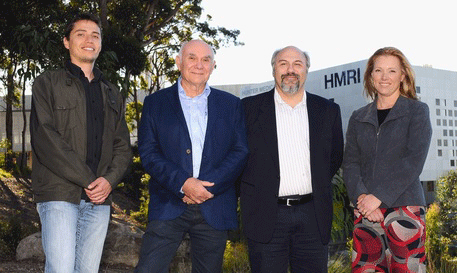Artificial pancreas
Details of a revolutionary 'artificial pancreas' being jointly developed by University of Newcastle engineers and HMRI diabetes researchers were revealed today with the launch of a new website – www.artificialpancreas.com.au.

The system comprises a blood glucose sensor and an insulin infusion pump that operate continuously in a closed loop, linking via bluetooth to a smartphone-based management system.
The secret, according to Laureate Professor Graham Goodwin from the University of Newcastle's Research Centre for Complex Dynamic Systems and Control, is an intelligent algorithm created to calculate and deliver precise insulin dosage.
Clinical trials for type 1 diabetics are now planned for 2015 after an approved simulator achieved encouraging results.
"It's early days but we think we have a chance of building a world-beating system with smarter technology and better blood glucose management than other therapies have offered," Laureate Professor Goodwin said.
"In our modelling we can control blood glucose levels to within 5 per cent accuracy, but it's likely the unit will need to be calibrated to the individual and be adaptive with time."
Dr Bruce King, a Paediatric Endocrinologist at John Hunter Children's Hospital, says the artificial pancreas will help eliminate the guesswork from diabetes management.
"Children and their parents currently have to calculate how many carbohydrates are in a meal and check the blood glucose level every time they eat to work out insulin dose, but this method doesn't factor in other nutrients which can have a bearing," Dr King said. "The device will do it for them. That means fewer needles, fewer blood tests and more accurate results."
Dr King adds that the Australian-designed system will manage blood glucose levels in the normal range, whereas foreign devices under development are aiming to run at higher levels.
Carly Stephen, an electrical engineer and the mother of a young diabetic, has served as an advisor to the medical team during the scoping process. Her son Jack was diagnosed with type 1 diabetes three years ago at the age of 6.
"Jack is on an insulin pump, which is a lot better than needles for us but is still unpredictable," Mrs Stephen said. "His levels are a rollercoaster because he's an active child, always running around, and it's difficult for him to go to parties alone because he needs help calculating his insulin.
"He's had severe lows and also ended up in hospital. Nights are the most anxious time because Jack can have a 'hypo' in his sleep and not be able to tell us."
Carly and husband Sean perform a finger-prick test on Jack 10 to 15 times a day, which will be negated by the artificial pancreas.
"The insulin dosage will be automated and more accurate than we can achieve. It will look after Jack's levels and give him back his independence," Mrs Stephen said.
Research associate Dr Adrian Medioli said mimicking a healthy pancreas's ability to adjust to exercise and eating presented ongoing real-time challenges.
"The biological system measures and acts instantaneously whereas we're measuring around 15 minutes late," he said. "Also, we're trying to fix a broken system, whereby the body's blood glucose level can go up but there's no mechanism to bring it down."
The system is initially being targeted at type 1 diabetes but could also be tailored for type 2. It is expected to cost several thousand dollars but will reap savings in health costs because of fewer complications for patients.
For details see www.artificialpancreas.com.au
Contact
- Media and Public Relations.
- Phone: +61 2 4921 5577.
Related news
- Shanae’s passion for caring delivers her dream to work in health
- Food and nutrition degree serves Keren a rewarding career
- Kicking goals on and off the field, Joeli proves you can do it all
- Proving age is just a number, Arlyn wants to inspire more women in their 50s to pursue education
- Earth Sciences expert Professor Frisia cements global standing
The University of Newcastle acknowledges the traditional custodians of the lands within our footprint areas: Awabakal, Darkinjung, Biripai, Worimi, Wonnarua, and Eora Nations. We also pay respect to the wisdom of our Elders past and present.